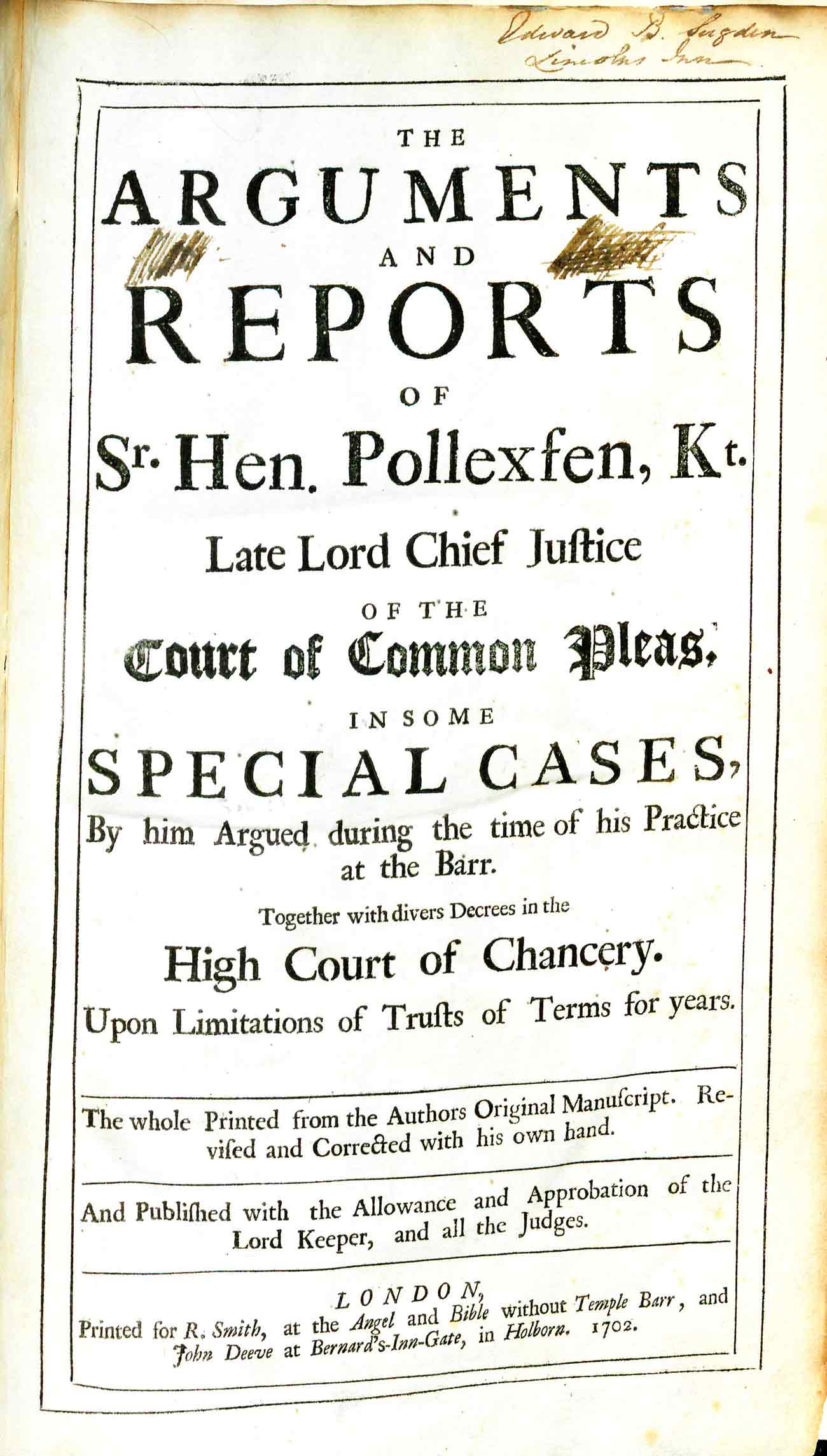Difference between revisions of "Arguments and Reports of Sr. Hen. Pollexfen"
| Line 15: | Line 15: | ||
|pages=[2], 250 (i. e. 246), 369-664, [8] | |pages=[2], 250 (i. e. 246), 369-664, [8] | ||
|desc=Folio (33 cm.) | |desc=Folio (33 cm.) | ||
| + | |shelf=F-5 | ||
}}[http://en.wikipedia.org/wiki/Henry_Pollexfen Sir Henry Pollexfen] (c.1632–1691) entered the [http://en.wikipedia.org/wiki/Inner_Temple Inner Temple] in 1652 and was called to the bar in 1658.<ref>Paul D. Halliday, "[http://www.oxforddnb.com/view/article/22474 Pollexfen, Sir Henry (c.1632–1691)]" in ''Oxford Dictionary of National Biography'', accessed June 5, 2013.</ref> In 1674 he became a [http://en.wikipedia.org/wiki/Bencher bencher] of his inn. Very successful in his profession, Pollexfen "seems to have been engaged in most of the important cases in the latter part of the reign of Charles II. and in that of James II."<ref>John William Wallace, ''The Reporters, Arranged and Characterized with Incidental Remarks'', 4th ed. (Boston: Soule and Bugbee, 1882), 346.</ref> After the Revolution of 1688 that overthrew James II, Pollexfen served a brief stint as attorney-general in 1689, then as Chief Justice of the [http://en.wikipedia.org/wiki/Court_of_Common_Pleas_%28England%29 Court of Common Pleas] from 1689-1691. | }}[http://en.wikipedia.org/wiki/Henry_Pollexfen Sir Henry Pollexfen] (c.1632–1691) entered the [http://en.wikipedia.org/wiki/Inner_Temple Inner Temple] in 1652 and was called to the bar in 1658.<ref>Paul D. Halliday, "[http://www.oxforddnb.com/view/article/22474 Pollexfen, Sir Henry (c.1632–1691)]" in ''Oxford Dictionary of National Biography'', accessed June 5, 2013.</ref> In 1674 he became a [http://en.wikipedia.org/wiki/Bencher bencher] of his inn. Very successful in his profession, Pollexfen "seems to have been engaged in most of the important cases in the latter part of the reign of Charles II. and in that of James II."<ref>John William Wallace, ''The Reporters, Arranged and Characterized with Incidental Remarks'', 4th ed. (Boston: Soule and Bugbee, 1882), 346.</ref> After the Revolution of 1688 that overthrew James II, Pollexfen served a brief stint as attorney-general in 1689, then as Chief Justice of the [http://en.wikipedia.org/wiki/Court_of_Common_Pleas_%28England%29 Court of Common Pleas] from 1689-1691. | ||
| Line 26: | Line 27: | ||
View the record for this book in [https://catalog.swem.wm.edu/law/Record/46158 William & Mary's online catalog.] | View the record for this book in [https://catalog.swem.wm.edu/law/Record/46158 William & Mary's online catalog.] | ||
| + | |||
| + | ==See also== | ||
| + | *[[George Wythe Room]] | ||
| + | *[[Wythe's Library]] | ||
| + | |||
==References== | ==References== | ||
<references/> | <references/> | ||
Revision as of 12:41, 3 July 2015
by Sir Henry Pollexfen
| Pollexfen's Reports | |
|
Title page from The Arguments and Reports of Sr. Hen. Pollexfen, George Wythe Collection, Wolf Law Library, College of William & Mary. | |
| Author | Sir Henry Pollexfen |
| Published | London: Printed for R. Smith and John Deeve |
| Date | 1702 |
| Edition | First |
| Language | English |
| Pages | [2], 250 (i. e. 246), 369-664, [8] |
| Desc. | Folio (33 cm.) |
| Location | Shelf F-5 |
Sir Henry Pollexfen (c.1632–1691) entered the Inner Temple in 1652 and was called to the bar in 1658.[1] In 1674 he became a bencher of his inn. Very successful in his profession, Pollexfen "seems to have been engaged in most of the important cases in the latter part of the reign of Charles II. and in that of James II."[2] After the Revolution of 1688 that overthrew James II, Pollexfen served a brief stint as attorney-general in 1689, then as Chief Justice of the Court of Common Pleas from 1689-1691.
Pollexfen's Reports primarily cover property cases from 1669 to 1685[3] and the copies "are very incorrect, varying in the pages, and in the dates ..."[4] One author writes that "they tell us very much more of the reporter's arguments than of the decision of the court"[5] while another grants that "a large share of [the] decisions are of moderate importance ... yet when applicable they are cited with effect.[6]
Evidence for Inclusion in Wythe's Library
Brown's Bibliography[7] includes the 1st (1703) edition Pollexfen's Reports based on quotations in the manuscript copy of John Marshall's law notes. The Wolf Law Library followed Brown's suggestion and moved a copy of this edition from another rare book collection to the George Wythe Collection.
Description of the Wolf Law Library's copy
Rebound in period style with blue label and red marbelled endpapers. Signature of "Nathan Sanford" on title page and first page of text. Purchased through the generosity of Daniel W. Baran and Lena Stratton Baran, Class of 1936.
View the record for this book in William & Mary's online catalog.
See also
References
- ↑ Paul D. Halliday, "Pollexfen, Sir Henry (c.1632–1691)" in Oxford Dictionary of National Biography, accessed June 5, 2013.
- ↑ John William Wallace, The Reporters, Arranged and Characterized with Incidental Remarks, 4th ed. (Boston: Soule and Bugbee, 1882), 346.
- ↑ Halliday, "Pollexfen, Sir Henry."
- ↑ Richard Whalley Bridgman, A Short View of Legal Bibliography: Containing Some Critical Observations on the Authority of the Reporters and Other Law Writers (London: Printed for W. Reed, 1807), 257.
- ↑ W. S. Holdsworth, A History of English Law (London: Methuen & Co., Sweet and Maxwell, 1924), 6:561.
- ↑ J. G. Marvin, Legal Bibliography or a Thesaurus of American, English, Irish, and Scotch Law Books (Philadelphia: T. & J. W. Johnson, Law Booksellers, 1847), 576-77.
- ↑ Bennie Brown, "The Library of George Wythe of Williamsburg and Richmond," (unpublished manuscript, May, 2012) Microsoft Word file. Earlier edition available at: https://digitalarchive.wm.edu/handle/10288/13433.
